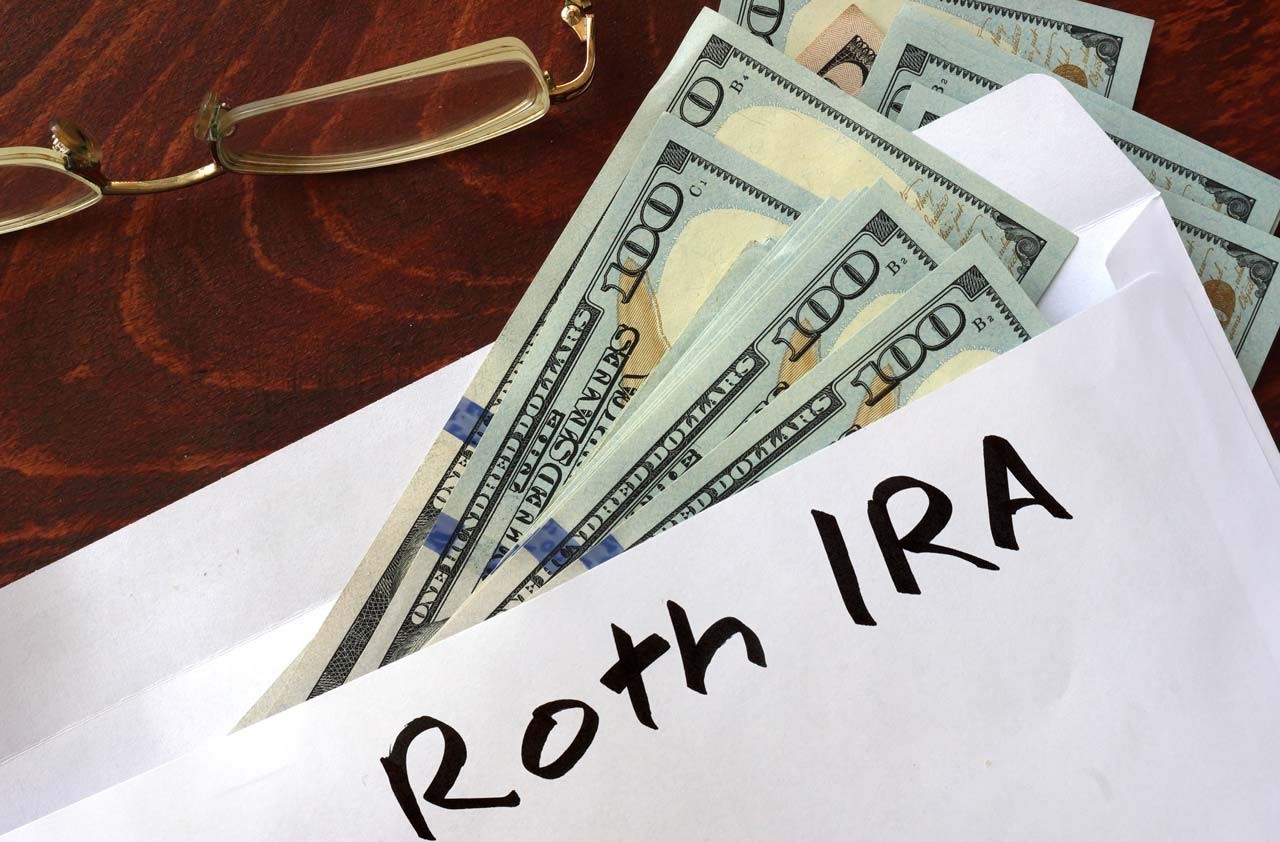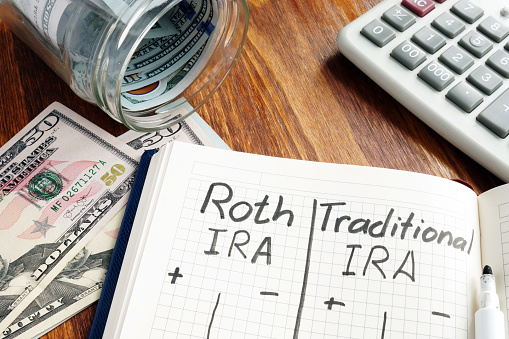Why Stocks Are Best Held in a Roth IRA
Holding stocks in a Roth IRA makes the most of this tax-free account's features.


Profit and prosper with the best of Kiplinger's advice on investing, taxes, retirement, personal finance and much more. Delivered daily. Enter your email in the box and click Sign Me Up.
You are now subscribed
Your newsletter sign-up was successful
Want to add more newsletters?

Delivered daily
Kiplinger Today
Profit and prosper with the best of Kiplinger's advice on investing, taxes, retirement, personal finance and much more delivered daily. Smart money moves start here.

Sent five days a week
Kiplinger A Step Ahead
Get practical help to make better financial decisions in your everyday life, from spending to savings on top deals.

Delivered daily
Kiplinger Closing Bell
Get today's biggest financial and investing headlines delivered to your inbox every day the U.S. stock market is open.

Sent twice a week
Kiplinger Adviser Intel
Financial pros across the country share best practices and fresh tactics to preserve and grow your wealth.

Delivered weekly
Kiplinger Tax Tips
Trim your federal and state tax bills with practical tax-planning and tax-cutting strategies.

Sent twice a week
Kiplinger Retirement Tips
Your twice-a-week guide to planning and enjoying a financially secure and richly rewarding retirement

Sent bimonthly.
Kiplinger Adviser Angle
Insights for advisers, wealth managers and other financial professionals.

Sent twice a week
Kiplinger Investing Weekly
Your twice-a-week roundup of promising stocks, funds, companies and industries you should consider, ones you should avoid, and why.

Sent weekly for six weeks
Kiplinger Invest for Retirement
Your step-by-step six-part series on how to invest for retirement, from devising a successful strategy to exactly which investments to choose.
Question: I’ve heard that stocks should be held in a Roth IRA and bonds should be held in a traditional IRA. But for tax-efficiency, shouldn’t cash-generating assets be held in the Roth and index funds in the other IRA?
Answer: Given the tax characteristics of the two types of IRAs, it’s generally better to hold investments with the greatest growth potential, typically stocks, in a Roth, while assets with more moderate returns, usually bonds, in a traditional IRA.
Here’s why: You invest in a Roth with after-tax dollars that can then grow and compound free of tax. Withdrawals will also be tax-free once you reach the age of 59 ½ and you’ve held the Roth for five years. And unlike a 401(k) or traditional IRA, you’re not required to start taking minimum withdrawals after age 70 ½. That means Roth investments can continue to grow for possibly decades.
From just $107.88 $24.99 for Kiplinger Personal Finance
Become a smarter, better informed investor. Subscribe from just $107.88 $24.99, plus get up to 4 Special Issues

Sign up for Kiplinger’s Free Newsletters
Profit and prosper with the best of expert advice on investing, taxes, retirement, personal finance and more - straight to your e-mail.
Profit and prosper with the best of expert advice - straight to your e-mail.
“Having your most aggressive or riskiest investments in your Roth is designed to maximize that tax free growth,” says Michael Peterson, a certified financial planner in Chambersburg, Pa. And if you don’t need the money in retirement, you can leave the Roth to your heirs, who will be able to take tax-free withdrawals, too.
With a traditional IRA, you’re investing with pretax dollars if you deduct your contributions on your federal tax return. Withdrawals are subject to ordinary income tax. By putting taxable bonds in a traditional IRA, you can get tax-deferred growth until you must start making withdrawals, says Peterson. And because bonds tend to have moderate returns than stocks, the tax bite when making withdrawals can also be much less than if you were selling greatly appreciated stocks from a traditional IRA, he says.
Additionally, if you hold volatile stocks in a traditional IRA, you might be forced to sell them during a mandatory distribution for a loss when the markets tumble, says Mike Giefer, a CFP from Minneapolis. This is less of a risk with bonds, which tend to be more stable, he says.
Don’t overlook the benefits of a taxable investment account. This is where you should hold municipal bonds whose interest is not federally taxed and can be exempt from state taxes, too, if the bonds are issued within your state. A taxable account can also be a good place for stocks that throw off few, if any, dividends.
Once you sell securities that have been held for more than a year in a taxable account, the profit will be taxed at a long-term capital gains tax rate–0% to 23.8 %, depending on your income. For many investors, that’s lower than their regular income tax rate. And if, say, some stocks throw off dividends, these often qualify to be taxed at long-term capital gains tax rates, too. (Non-qualified dividends, which include those from employee stock options and real estate investment trusts, are taxed at ordinary income tax rates.)
Profit and prosper with the best of Kiplinger's advice on investing, taxes, retirement, personal finance and much more. Delivered daily. Enter your email in the box and click Sign Me Up.

-
 Nasdaq Leads a Rocky Risk-On Rally: Stock Market Today
Nasdaq Leads a Rocky Risk-On Rally: Stock Market TodayAnother worrying bout of late-session weakness couldn't take down the main equity indexes on Wednesday.
-
 Quiz: Do You Know How to Avoid the "Medigap Trap?"
Quiz: Do You Know How to Avoid the "Medigap Trap?"Quiz Test your basic knowledge of the "Medigap Trap" in our quick quiz.
-
 5 Top Tax-Efficient Mutual Funds for Smarter Investing
5 Top Tax-Efficient Mutual Funds for Smarter InvestingMutual funds are many things, but "tax-friendly" usually isn't one of them. These are the exceptions.
-
 Do Global Funds Have a Place in Your Portfolio?
Do Global Funds Have a Place in Your Portfolio?investing A global fund provides exposure to U.S. and foreign stocks, including shares of companies in emerging markets.
-
 How Long You Must Wait to Make Penalty-Free Withdrawals After Converting to a Roth IRA
How Long You Must Wait to Make Penalty-Free Withdrawals After Converting to a Roth IRAsavings The timing of converting money from a traditional IRA to a Roth can affect how long you must wait before you’re allowed to withdraw money without penalty.
-
 What Grandparents Need to Know About Using Savings Bonds for a Grandchild’s Education
What Grandparents Need to Know About Using Savings Bonds for a Grandchild’s EducationTax Breaks It’s not easy, but grandparents can avoid a tax bill when redeeming savings bonds to pay for a grandchild’s college costs.
-
 Why Your Investment Return May Differ From the Fund Company's Returns
Why Your Investment Return May Differ From the Fund Company's Returnsinvesting The amount you invest, the timing and the price you paid for the shares will determine your return when investing in a mutual fund.
-
 How to Add Treasury Bonds, Bills and Notes to an IRA
How to Add Treasury Bonds, Bills and Notes to an IRAinvesting If you are wondering how to add Treasury bills, bonds and notes to an IRA, there are ways to do so.
-
 How to Avoid Required Distributions from a Roth 401(k)
How to Avoid Required Distributions from a Roth 401(k)retirement Rolling a Roth 401(k) into a Roth IRA can eliminate required distributions for investors who want their money to continue to grow tax-free.